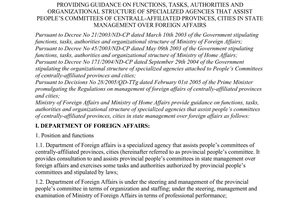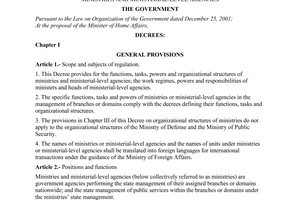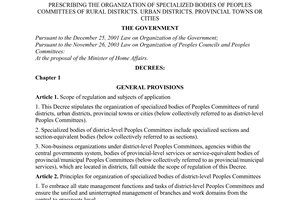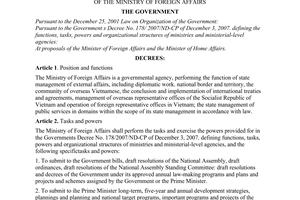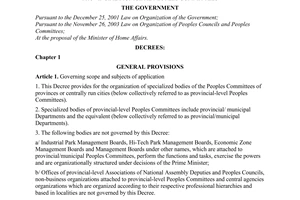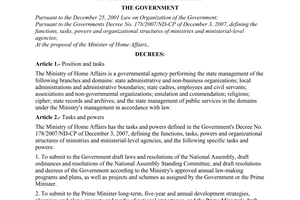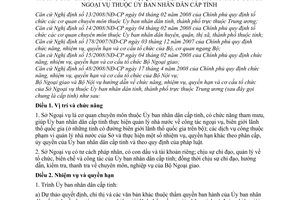Nội dung toàn văn Joint circular No. 02/2009/TTLT-BNG-BNV of May 27, 2009, guiding the functions, tasks, powers and organizational structure of Foreign Affairs Services under Provincial-Level People's Committees.
|
THE
MINISTRY OF FOREIGN AFFAIRS - THE MINISTRY OF HOME AFFAIRS |
SOCIALIST
REPUBLIC OF VIET NAM |
|
Hanoi, May 27, 2009 |
JOINT CIRCULAR
GUIDING THE FUNCTIONS, TASKS, POWERS AND ORGANIZATIONAL STRUCTURE OF FOREIGN AFFAIRS SERVICES UNDER PROVINCIAL-LEVEL PEOPLE'S COMMITTEES
Pursuant to the Government's
Decree No. 13/ 2008/ND-CP of February 4, 2008, prescribing the organization of professional
agencies under People's Committees of provinces and centrally run cities;
Pursuant to the Government's Decree No. 14/ 2008/ND-CP of February 4, 2008,
prescribing the organization of professional agencies under People's Committees
of districts, towns and provincial cities;
Pursuant to the Government's Decree No. 178/2007/ND-CP of December 3, 2007,
defining the Junctions, tasks, powers and organizational structures of
ministries and ministerial-level agencies;
Pursuant to the Government's Decree No. 15/ 2008/ND-CP of February 4, 2008,
defining the functions, tasks, powers and organizational structure of the
Ministry of Foreign Affairs;
Pursuant to the Government's Decree No. 48/ 2008/ND-CP of April 17, 2008,
defining the functions, tasks, powers and organizational structure of the
Ministry of Home Affairs;
The Ministry of Foreign Affairs and the Ministry of Home Affairs jointly
guide the functions, tasks, powers and organizational structure of Foreign
Affairs Services under People's Committees of provinces and centrally run
cities (below referred to as provincial-level People's Committees) as follows:
Article 1. Position and functions
1. The Foreign Affairs Service is a professional agency under the provincial-level People's Committee and functions to advise and assist the latter in performing the state management of foreign affairs and national border and territory (in provinces having land national borderlines); provide public services under its state management and perform a number of tasks and powers under law and as decentralized or authorized by the provincial-level People's Committee.
2. The Foreign Affairs Service has the legal entity status, its own seal and account: its organization, payroll and operation is subject to the direction and management by the provincial-level People's Committee; and its professional operations are subject to the professional direction, guidance, examination and inspection by the Ministry of Foreign Affairs.
Article 2. Tasks and powers
1. To submit to the provincial-level People's Committee:
a/ Draft decisions and directives and other documents on foreign affairs and national border and territory (in provinces having land national borderlines) to be promulgated by the provincial-level People's Committee;
b/ Draft master plans and long-term, five-year and annual plans and programs, schemes and projects on foreign affairs and national border and territory (in provinces having land national borderlines); and methods to reform state administration of foreign affairs and border under its management;
c/ Draft documents on criteria for posts of heads and deputy heads of the Service's units.
2. To submit to the provincial-level People's Committee president:
a/ Draft decisions and directives on foreign affairs and national border and territory (in provinces having land national borderlines) to be promulgated by the provincial-level People's Committee president;
b/ Draft decisions to establish, merge or dissolve the Service's units under law.
3. To guide, examine and organize the implementation of legal documents, masters plans, plans, programs, schemes, projects and other issues on foreign affairs and national border and territory (in provinces having land national borderlines) after they are approved; to organize public information, propagation, dissemination and education about domains under its management.
4. To organize and manage incoming and outgoing delegations:
a/ To uniformly manage delegations on overseas working visits and receive visiting foreign and international delegations in the province under law and as decentralized by the provincial-level People's Committee;
b/ To receive international delegations visiting and working with the provincial-level People’s Committee; to assume the prime responsibility for, and coordinate with concerned units in, organizing overseas working trips of leaders of the provincial-level People's Committee; to collect and sum up data on overseas working trips of cadres and civil servants under the management of the provincial-level People's Committee.
5. Consular work:
a/ To receive dossiers of, examine, manage and propose, the grant, extension, modification and supplementation of diplomatic and official passports under law;
b/ To coordinate with concerned services, sections and branches in administering the exit and entry of Vietnamese citizens and foreigners in the province; to monitor and review the migration of Vietnamese and foreign citizens in the province; to settle sensitive and complicated consular issues in the province;
c/ To guide and manage activities of foreign individuals and organizations concerning their own civil status, assets, travel, business, living, study, working, tourism, business or investment in the province in accordance with Vietnam law.
6. External information:
a/ To coordinate with concerned agencies in implementing local programs and plans on external information and communication already approved by the provincial-level People's Committee;
b/ To supply to the Ministry of Foreign Affairs and competent agencies information related to the province in service of external communication;
c/To collect, analyze and sum up information on international and regional political, security and economic situation in service of local socioeconomic development;
d/ To uniformly manage foreign correspondents practicing in the province; to formulate working programs for provincial-level People's Committee leaders to receive and give interviews to foreign correspondents, to supply information in line with state guidelines and monitor and manage activities of foreign correspondents under law.
7. Foreign non-governmental organizations and individuals:
a/ To coordinate with concerned agencies in raising and managing under law aid under humanitarian or development programs or projects and emergency aid provided by foreign non-governmental organizations to the province;
b/ To support administrative procedures for the implementation of humanitarian, development or emergency aid programs or projects provided by foreign non-governmental organizations to the province.
8. National border and territory: a/ To act as the standing body of the provincial-level People's Committee for national border and territory affairs; to assist the provincial-level People's Committee in performing tasks related to national border and territory in the province under law;
b/ To act as the standing body of the provincial-level steering committee for border demarcation and marker placement; to assume the prime responsibility for, and coordinate with concerned agencies in, elaborating schemes and plans and conducting unilateral and bilateral surveys; to coordinate with concerned agencies in demarcating borders and placing markers at the request of the provincial-level steering committee for border demarcation and marker placement;
c/ To monitor, review and report to the provincial-level People's Committee and the Ministry of Foreign Affairs on the implementation of treaties on national border and the regulation on land border management and disputes over land or sea in the province;
d/ To organize training and dissemination of laws, guidelines and policies of the Party and State on national border and territory; to guide, examine and manage documents, materials, maps and records on borders under the locality's management.
9. External economic affairs:
a/ To assist the provincial-level People's Committee in implementing programs on external activities in service of local socioeconomic development after they are approved by competent authorities;
b/ To coordinate with concerned agencies and overseas Vietnamese representative missions in seeking, selecting and verifying foreign partners doing business, entering into economic joint ventures or partnerships or making investment in the locality as assigned by the provincial-level People's Committee;
c/ To take part in economic, trade, investment and tourism promotion activities and build an investment and business environment in conformity with the local socio-economic development strategy; to assist local enterprises in expanding cooperation with other countries.
10. External cultural affairs:
a/ To organize external cultural programs of the locality after they are approved by the provincial-level People's Committee;
b/ To coordinate with concerned agencies in organizing external cultural events in the locality and building and promoting the image of local people and culture overseas.
11. Overseas Vietnamese-related affairs:
a/ To implement programs, plans and policies for overseas Vietnamese in the locality under the Ministry of Foreign Affairs' guidance;
b/ To coordinate with provincial-level services, sections and branches in providing information on guidelines and policies of the Party and State toward overseas Vietnamese; to mobilize, guide and support overseas Vietnamese and their relatives in the locality in local activities;
c/ To regularly review, assess and propose solutions to issues related to overseas Vietnamese and their relatives in the locality.
12. To hold conferences and seminars and conclude and implement international agreements; to implement treaties in the locality:
a/ To uniformly manage the organization of conferences and seminars and the conclusion and implementation of international agreements, to implement treaties under law;
b/ To report to and seek opinions from competent authorities on the settlement of complicated matters related to foreign affairs and national border and territory (in provinces having land national borderlines) in the locality.
13. To implement its administrative reform program in line with the objectives and contents of the administrative reform program of the provincial-level People's Committee.
14. To provide professional guidance on foreign affairs for cadres and civil servants in charge of foreign and border affairs of district-level People's Committees (of localities having land national borderlines).
15. To organize scientific and technological research and application; to develop database and information and archives systems to serve state management and professional operations of foreign and border affairs.
16. To examine, inspect, and handle violations and settle complaints and denunciations; to prevent and fight corruption; to practice thrift and fight waste in foreign and border affairs under law or as assigned or decentralized by the provincial-level People's Committee.
17. To regularly and extraordinarily review, summarize, supply information and report on the performance of assigned tasks on foreign and border-related affairs according to regulations of the provincial-level People's Committee and the Ministry of Foreign Affairs.
18. To define the functions, tasks, powers and working relations of the Service's units; to manage the organization and payroll and implement wage regimes and policies and mechanisms on preferential treatment, training, retraining, appointment, relief from duty, commendation and disciplining of cadres, civil servants and public employees under its management according to law and as decentralized by the provincial-level People's Committee.
19. To manage finance and assets assigned to it and disburse allocated state budget funds under law and as decentralized by the provincial-level People's Committee.
20. To perform other tasks assigned by the provincial-level People's Committee and under law.
Article 3. Organizational structure
1. Leadership
a/ A Foreign Affairs Service has a director and no more than 3 deputy directors.
b/ The director is the head of the Service and shall take responsibility to the provincial-level People's Committee, the provincial-level People's Committee president and law for the operation of the Service;
c/ Deputy directors shall assist the director and take responsibility to the director and law for their assigned tasks; when the director is absent, a deputy director may be authorized by the director to administer the operation of the Service;
d/ The provincial-level People's Committee president shall decide on the appointment of the director and deputy directors of the Service according to law and criteria on professional qualifications and skills promulgated by the Ministry of Foreign Affairs; the relief from office, dismissal, commendation and disciplining of. and other regulations and policies applicable to. the director and deputy directors of the Service comply with law.
2. Organizational structure
a/ The following sections shall be uniformly set up:
- The Office;
- The Inspectorate;
(The Office of the Service is in charge of planning-finance and organization-personnel affairs)
b/ Based on the nature, characteristics and specific management requirements for foreign affairs of each locality, the Foreign Affairs Service director shall assume the prime responsibility for. and coordinate with the Home Affairs Service director in. proposing the provincial-level People's Committee president to decide on the number and names of professional sections of the Service to fully cover the domains under the Service's management, provided the total number of sections, including the Office and the Inspectorate, does not exceed 5.
c/ Based on local characteristics and requirements, the Foreign Affairs Service director shall assume the prime responsibility for, and coordinate with the Home Affairs Service director in, proposing the provincial-level People's Committee to decide on the establishment of non-business organizations under the Service in accordance with approved planning and law.
Article 4. Payroll
1. The provincial-level People's Committee shall decide on the administrative payroll of the Foreign Affairs Service within the province's total centrally assigned administrative payroll;
2. The provincial-level People's Committee shall decide on the non-business payroll within the payroll limits and under law.
Article 5. State management of foreign affairs and national border and territory in provinces ineligible for establishing Foreign Affairs Services
1. Provinces that fail to meet the criteria for establishing Foreign Affairs Services under Points a and b, Clause 1. Article 9 of the Government's Decree No. 13/2008/ND-CP of February 4. 2008, prescribing the organization of professional agencies of People's Committees of provinces and centrally run cities may set up Foreign Affairs Sections under provincial-level People's Committees.
A Foreign Affairs Section is directly managed by the provincial-level People's Committee; the Office of the provincial-level People's Committee shall ensure material foundations and administration for the operation of the Foreign Affairs Section; the director of the Office of the provincial-level People's Committee shall perform the state management of foreign affairs and national border and territory (in provinces having land national borderlines) in the locality as authorized by the provincial-level People's Committee president.
The Foreign Affairs Section functions to advise and assist the director of the Office of the provincial-level People's Committee in performing the state management of foreign affairs and national border and territory (in provinces having land national borderlines) in the locality. Based on the tasks specified in Article 2 of this Circular, the director of the Office of the provincial-level People's Committee shall specify tasks and powers of the Foreign Affairs Section.
A Foreign Affairs Section has a head and no more than 2 deputy heads.
The director of the Office of the provincial-level People's Committee shall decide on the appointment of the head and deputy heads of the Foreign Affairs Section according to law and criteria on professional qualifications and skills; the relief from office, dismissal, commendation and disciplining of and other regulations and policies applicable to the head and deputy heads of a Foreign Affairs Section comply with law and the decentralization of the provincial-level People's Committee.
2. The director of the Office of the provincial-level People's Committee shall decide on the administrative payroll of the Foreign Affairs Section within the total administrative payroll of the Office of the provincial-level People's Committee assigned by the provincial-level People's Committee.
Article 6. Organization of implementation
1. This Circular takes effect 45 days from the date of its signing and replaces Joint Circular No. 22/2005/TTLT-BNG-BNV of December 22, 2005, of the Ministry of Foreign Affairs and the Ministry of Home Affairs, guiding the functions, tasks, powers and organizational structures of professional agencies assisting People's Committees of provinces and centrally run cities in the state management of foreign and border affairs in localities.
2. Provincial-level People's Committees shall:
a/ Specify the functions, tasks, powers and organizational structure of Foreign Affairs Services; guide district-level Peoples Committees in defining the tasks and powers and arranging sufficient payroll and civil servants in charge of foreign and border affairs (for district-level units of localities having land national borderlines);
b/ Based on local characteristics, socioeconomic development situation and state management requirements for foreign affairs, decide to establish, merge, dissolve, split or reorganize non-business organizations of Foreign Affairs Services according to approved planning and this Circular.
3. Presidents of provincial-level People's Committees shall implement this Circular.
Any problems arising in the course of implementation should be promptly reported to the Ministry of Foreign Affairs and the Ministry of Home Affairs for consideration and settlement according to their competence.
|
MINISTER
OF HOME AFFAIRS |
MINISTER
OF FOREIGN AFFAIRS |
